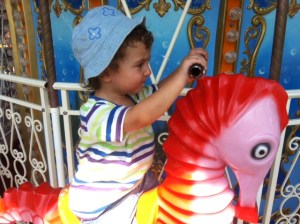One afternoon at university in London in 1989 I sat with three other students drinking a pint of Stella lager and smoking Bensons in a beer-soaked, nicotine-stained SOAS student union bar. We were all slightly older than the average first-year undergraduates – early to mid-twenties as opposed to late teens. I felt at least thirty. I had been around the world several times, lived in Berlin and Tokyo. Two of my fellow students had grown up in Catholic communities (one Irish, one Croatian). We were talking about children, about having them or not. I, most probably, was screwing up my nose. I didn’t like children. I certainly didn’t want one. Children ruined your life. And they were mean. Even I was. I remember very well pinching a child younger than me behind the stage at play school. I must have been four at the time. Before that I had hardly any memories. An old gas fire with black and orange teeth. A coffee table. Sitting in a pushchair outside the Co-op. Bluebottles on the windowsill. Looking out the window at the hedge and beyond at the traffic on the by-pass. Waiting.
No more. Therefore, I reckoned, life began at four. My little Leo turned two at the weekend. He’s already been to Spain five times, including Tenerife, England and has travelled most of the Algarve and Alentejo. Last week we were camping in Evora and watched clowns perform in the main square. Yesterday we saw sea lions and dolphins at Zoomarine. ‘See more seals!’ he said, dragging me around the pools. He chose a seahorse to ride on the carousel. 
On a trip in the National Parque de Cabañeros he pointed out the window at a bush and said, ‘medronho’ (the medronho bush with red berries used here in the Monchique mountains to make the local white spirit). He spotted deer and a fox (having only ever seen one on an iPad).
The other day in Continente he grabbed his own basket and started shopping – much to my horror. He understands the notion of subject, verb and object. ‘Leo do it’, ‘Mummy fetch Leo’, ‘Leo coming’, ‘Leo shopping’. He knows what he wants and in three languages and combines them fluently. ‘Mais eier. Thank you’. He’s like an elephant with places. If we go to a beach he hasn’t been to for a while he will go to where we sat the previous time and say, ‘Mama cake’ (clearly where I’d eaten cake). Aside from (still) chucking things into the pool and spitting food out, two is an amazing age.
‘So,’ said the Irish friend, ‘if you don’t think that children are conscious before four does that mean you’d agree with Herod and allow the killing of all babies of two and under? That’s what he did. He slaughtered all babies and young children.’
I didn’t know much about Herod but as I didn’t remember anything about being two, I shrugged and agreed. Not that it was a laudable act but that the children wouldn’t suffer as they wouldn’t remember. After all, we slaughter animals.
I still don’t know much about Herod and the biblical story or how much of it is true but I know a little more about being two years old and my answer now makes me shudder. The Irish woman shook her head, blew smoke out of her nose and looked at me in disgust. I can see myself sitting on that dark blue velvet poof defiantly sucking on a Benson’s and trying not to cough. It has become a painful memory.
But it worries me that we remember hardly anything in our first three to four years. Of course without language we have no means of storing information. Nonetheless, I find it strange that Leo will never remember his five minute shopping spree or all those travels to different places. Of course, all these experiences are stored in our bodies and brains and inform who we become. Many of my preconceptions about children were learned but I didn’t understand that then. These days our lives are also stored in iPads, computers, cameras and videos. I don’t make videos but my iPad is full of photos and Leo loves to flick through at night or in the morning. He remembers nearly all the places and people (or, at least, he has learned through repetition). I just hope that our travels make more of an impression than the dazzling shelves of supermarkets or where Mama has eaten cake.






